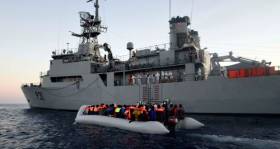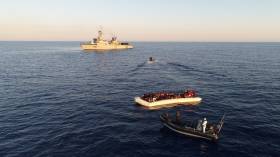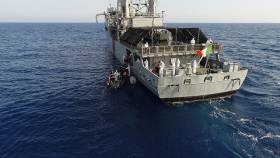Displaying items by tag: Refugees Rescued
Refugees Rescued by Irish Naval Service in Mediterranean Plummets
#Navy - Refugees rescued by Irish Naval Service vessels involved in humanitarian operations fell in numbers from 7,029 in 2016 to 1,888 last year, after a change in policy to focus on security operations targeting smugglers and a drop in the number of people attempting to cross the Mediterranean sea.
As The Irish Times writes, in July 2017, the Government received approval to join the EU’s Operation Sophia, as part of the EUnavforMed (EU Naval Force in the Mediterranean). Previously the Irish navy’s search and rescue work at sea was carried out as part of a bilateral agreement with Italy called Operation Pontus.
Up to July, 1,187 people trying to cross the Mediterranean were rescued by the Irish navy vessel LÉ Eithne, according to figures on Operation Pontus from the Department of Defence, with 701 rescued over the second half of the year.
To read more click here.
Naval Service Rescues Over 180 Refugees in the Mediterranean
#Refugees - LÉ Eithne of the Irish Naval Service writes the Journal.ie has rescued approximately 183 people yesterday (25 June) in the Mediterranean Sea, just north of the Libyan capital Tripoli.
While on patrol at around 6 am, the LÉ Eithne located and rescued 113 refugees from an inflatable craft 40km north-west of Tripoli.
The crew on the ship then identified another craft in distress, and a second rescue operation was launched.
A further 70 people were rescued from this boat.
There are currently 183 on board the LÉ Eithne and the Irish vessel is enroute to assist in another rescue operation in the region.
Rescue of 346 Migrants by LÉ Eithne off Libya
#RefugeeRescue- Following a request from the Italian Maritime Rescue Co-Ordination Centre, LÉ Eithne yesterday located and rescued a total of 135 migrants off Libya.
The migrants were found on an inflatable craft approx 83Km off the north-west coast of Tripoli.
The LÉ Eithne was subsequently appointed on scene coordinator by the Italian Maritime Rescue Co-Ordination to coordinate the rescue efforts of 3 NGO vessels dealing with 10 platforms in distress (PIDs).
The Naval Service flagship has now completed a second and third rescue of 211 migrants from two further inflatable craft, as well as taking 85 migrants on board from one of the NGO ships.
On board are 431 migrants (346 rescued, 85 transferred from NGO vessel) and is proceeding to two further PIDs, while also coordinating the NGO ships.
The migrants on board received food water and medical treatment where required.


























































